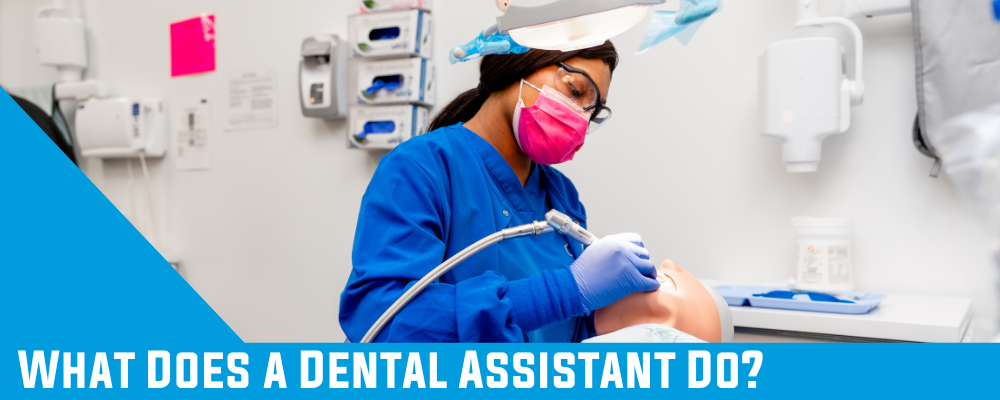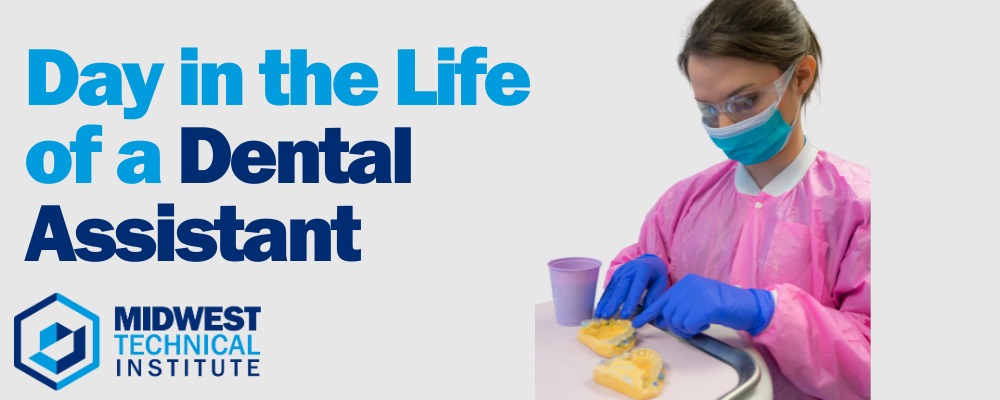If you’ve ever visited a dental office, you’ve likely encountered a dental assistant. These dynamic allied health professionals often have a combination of administrative and clinical job duties.
Are you interested in becoming a dental assistant? It’s important to understand what a dental assistant does, so that you can make an informed decision about whether this is the right career path for you!
What Do Dental Assistants Do?
Dental assistants handle a mix of administrative and clinical duties, so the scope of their responsibilities is wide-ranging, depending on where they work.
Here’s what a dental assistant does commonly in their role:
- Scheduling appointments for patients
- Asking patients about their medical history
- Taking patients vital signs
- Assisting the dentist during dental treatment
- Instructing patients in oral hygiene and plaque control
- Ordering dental supplies and equipment inventory
- Cleaning teeth with dental instruments
- Cleaning and polishing removable appliances
- Exposing dental diagnostic x-rays
- Creating and fitting orthodontic appliances and materials like retainers, wires, or bands
- Preparing bills and completing insurance forms
What Does an Expanded Duty Dental Assistant Do?
A dental assistant’s scope of work also varies by state. Some states do allow dental assistants to polish teeth to remove stains and plaque, or even apply sealants, fluoride, or topical anesthetic.
Below is an overview of which specialized duties permitted and not permitted to be performed by dental assistants in Illinois and Missouri, the two states where Midwest Technical Institute (MTI) offers Dental Assisting Programs.
By choosing to become an expanded duty dental assistant, you can perform a wider variety of tasks, such as coronal polishing. However, it is important to note that some of these duties require additional training or certification.
Dental Assistant Programs in Illinois
Are you interested in becoming a dental assistant in Illinois?
Dental assistant schools in Illinois do not teach students the following, as dental assistants in Illinois are not allowed to:
- Clean teeth
- Place sealants on the teeth
- Apply stainless steel crowns or fillings
- Repair or fill cavities
- Give or administer anesthetics (shots)
To perform these expanded functions under the supervision of a licensed dentist in Illinois, a dental assistant must meet Illinois state requirements for each expanded function.
However, dental assistants in Illinois are taught and permitted to:
- Apply fluoride
- Apply topical anesthetic
- Operate dental x-ray equipment
- Perform dental radiographic procedures
The Dental Assisting Program at MTI’s Illinois campuses requires students to take two of the three DANB (Dental Assisting National Board) certification exams: RHS (Radiology Health & Safety) and ICE (Infection Control Exam).
Dental Assistant Programs in Missouri
Looking to become a dental assistant in Missouri?
Dental assistants in the state of Missouri are taught and are able to perform the following duties without being certified (CDA) or an Expanded Functions Dental Assistant (EFDA).
- Clean teeth (Coronal Polishing)
- Place sealants on the teeth (Sealant Application)
- Apply fluoride
- Apply topical anesthetic
- Take x-rays
- Alginate impressions
In the state of Missouri, once you pass the Missouri Basic Skills Exam, you are eligible to begin taking Expanded Functions Courses.
At Midwest Technical Institute (MTI), the cost of this exam is included in the Dental Assisting Program tuition. The program includes review classes to help prepare students to take the exam. This is a great stepping stone to help prepare students to become an EFDA.
These are the expanded functions courses that Missouri dental assistants can take that allow dental assistants to:
- Restorative I: Place one surface filling
- Restorative II: Place two or more surface fillings
- Removable Prosthetics: Make partial denture and denture adjustments
- Fixed Prosthetics: Make temporary crowns, take final impressions
- Orthodontics: Place ortho wires and ligatures
According to a 2022 salary survey by DentalPost, dental assistants with expanded functions certification earn more than those without it.
- Average hourly wage for EFDA: $23.70
- Average hourly wage for Non-EFDA: $21.03
Interested in Learning More About Dental Assisting?
Fill out the form below to receive info about our career training programs.
Where Do Dental Assistants Work?
While the vast majority of dental assistants are employed by dentists, some also work in other industries. The U.S. of Bureau Labor Statistics (BLS) lists the following sectors as workplaces for dental assistants:
- Office of Dentists
- Offices of Physicians
- Outpatients Care Centers
- Federal Executive Branch
- State Government
- Employment Services
- Colleges, Universities, and Professional Schools
A Day in the Life of a Dental Assistant
To better understand what a dental assistant does, let’s examine a typical day in the life of a dental assistant.
Dental Assistant Clinical Duties
The day often starts with preparing the examination rooms and the dental equipment. This may include:
- Sterilizing and disinfecting instruments
- Setting up instrument trays
- Arranging materials
When patients begin arriving at the dentist’s office for their dental exam or treatment, dental assistants spring into action to assist, often completing tasks such as:
- Taking and recording patients’ medical and dental histories
- Measuring vital signs
- Helping the dentist by handing him or her instruments
- Providing post-operative instructions, as prescribed by the dentist, to the patient
- Teaching the patient about oral hygiene and plaque control to help them improve oral health
- Producing patient-assistive devices or device models & fitting them for the patient
- Operating medical equipment, including radiography (x-ray) machines
During dental procedures, dental assistants wear safety glasses, surgical masks, protective clothing, and gloves to safeguard themselves and other patients from infections. Furthermore, dental assistants are required to follow strict safety rules to reduce the risks associated with x-ray machines.
Dental Assistant Administrative Duties
Aside from assisting dentists with patients, a typical workday for dental assistants often includes various administrative tasks, including:
- Scheduling appointments
- Preparing medical bills
- Receiving insurance payments
- Processing insurance forms
- Maintaining patient records
- Conducting inventory counts
- Ordering supplies
Overall, dental assistants spend the majority of their day interacting with others, frequently in close proximity. They work with other members of the dentist’s office and care for the dentist’s patients.
Dental assistants certainly enhance the efficacy of a dentist’s office and improve the quality of care. Since this is a very people-oriented profession, it’s an ideal healthcare career for individuals who enjoy working with others and have strong communication skills.
Choose Your Future and Become a Dental Assistant in Illinois or Missouri
As a dental assistant, you’ll play an essential role supporting everyday patient care and the administrative functions of managing a dental practice.
MTI offers the Dental Assisting Program in Missouri and Illinois to provide you with the skills and experience you need to prepare for an entry-level career in the dental industry in just 9 months!
To learn more, fill out the form below or schedule a tour of the dental assisting program near you!
Sources
- https://www.bls.gov/ooh/healthcare/dental-assistants.htm#tab-2
- https://www.bls.gov/ooh/healthcare/dental-assistants.htm#tab-3
- https://www.bls.gov/oes/current/oes319091.htm#st



